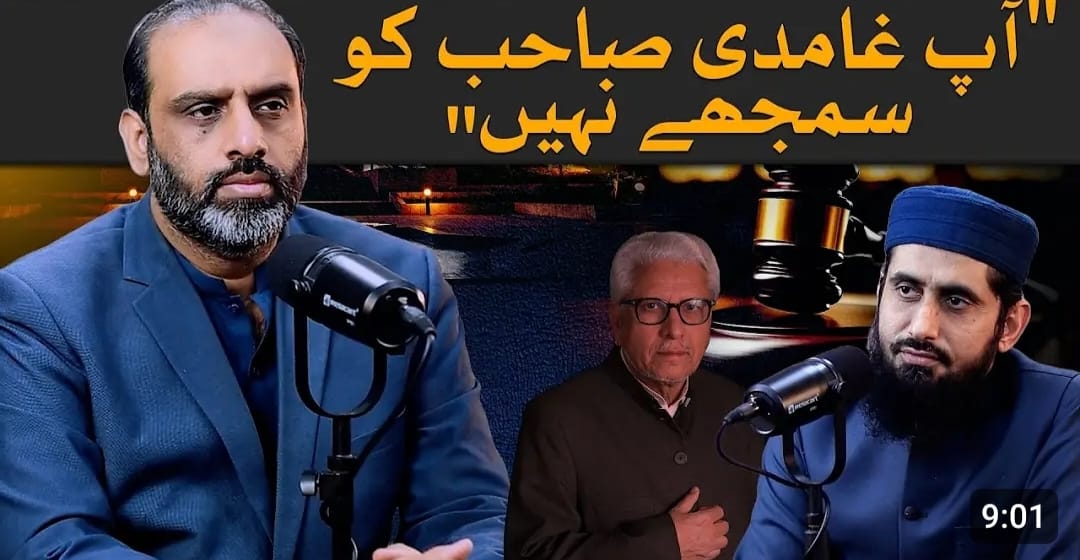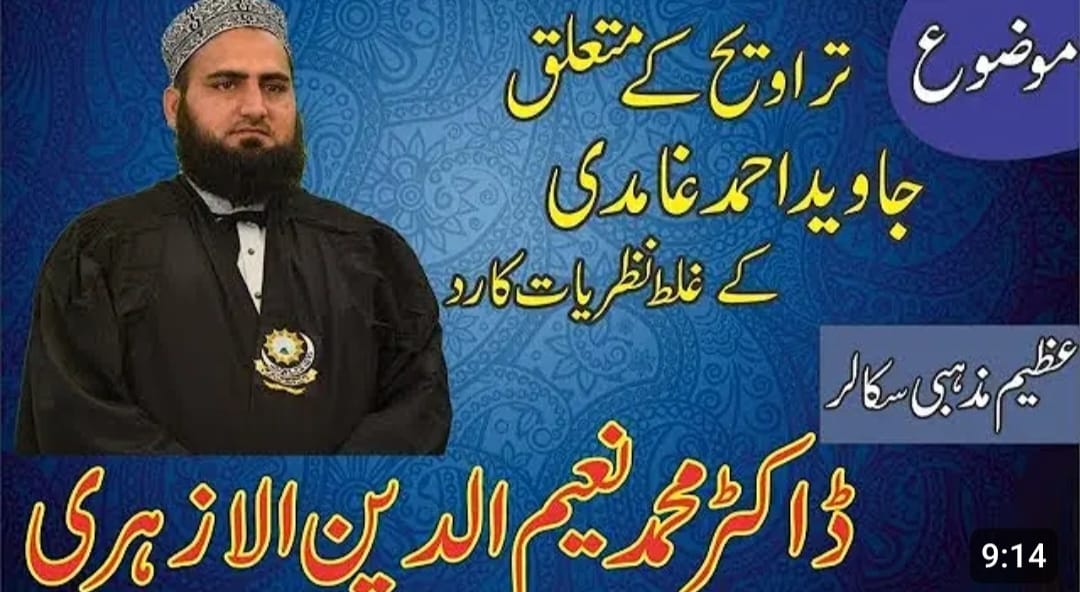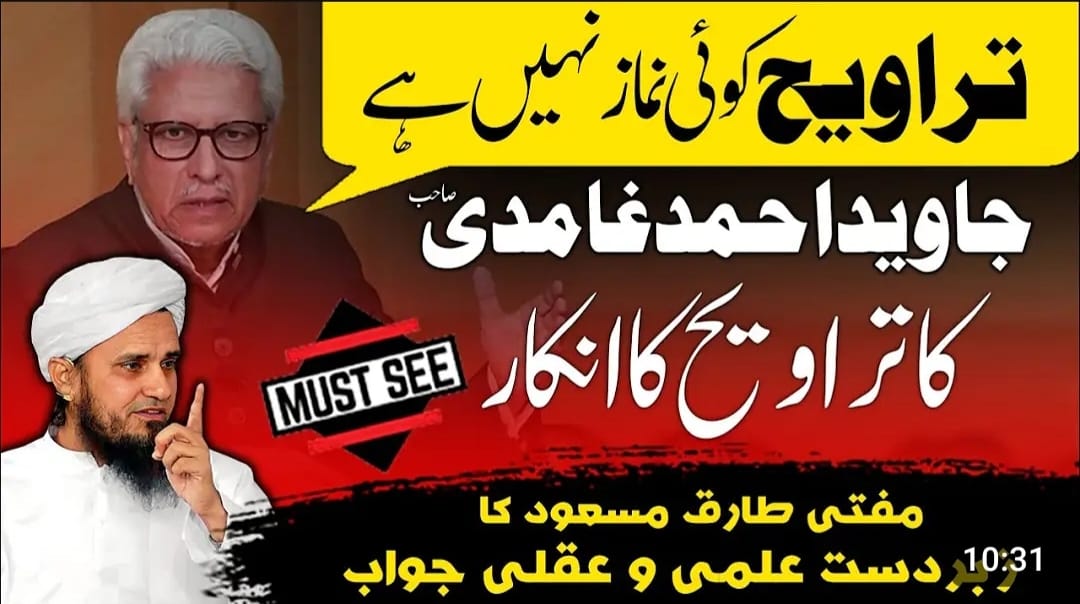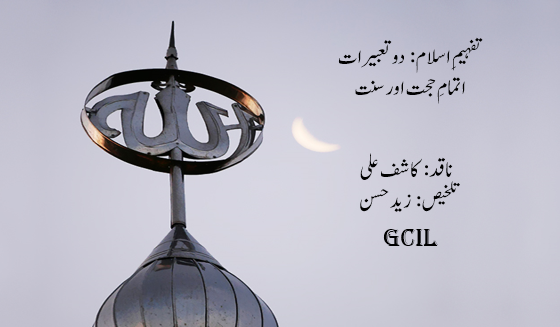Islam and the State — A Counter Narrative
The current predicament that some extremist organizations have created for Islam and Muslims worldwide through their actions is a result of the same ideology that is taught in our religious seminaries and incessantly propagated by Islamic movements and religious-political parties. In contrast, what is the correct view of Islam with regard to politics? I have written about extensively with detailed arguments in my book “Meezan.” This is essentially a counter narrative, and we have repeatedly stated that when discord is sown in Muslim societies on the basis of religion, it is not the preaching of secularism but a counter narrative based on true religious thought that can reform the situation. For details, one should refer to our book itself, but here we present a summary related to Islam and the State: the individual. It seeks to establish its influence over one’s heart and mind. The commands it has given to society are, in reality, addressed to those individuals who fulfill their responsibilities as decision-makers in the Muslim community. Therefore, the notion that an entity like state can also have a religion and needs to be Islamized through an Objectives Resolution and constitutionally bound not to enact any law against the Quran and Sunnah is completely baseless. Those who proposed this idea and succeeded in its wide reception have laid the foundation for permanent division in modern nation-states and have sent a message to the non-Muslims living in them that they are essentially second-class citizens, whose status at most can be that of a protected minority. If they can demand any rights from the real owners of the state, it is only in this capacity.
- In countries with a Muslim majority, they can establish a united federation. This can be a dream for each one of us, and we may strive to realize this dream, but there is no basis for the notion that this is a mandate of Islamic Shariah, the violation of which would make Muslims into sinners. By no means is the Caliphate a religious term, nor is its establishment at a global level a command of Islam. After the first century Hijri, when the great jurists among Muslims were still living, two of their states had already been established—the Abbasid Caliphate in Baghdad and the Umayyad Caliphate in Andalusia—and they endured for several centuries. However, none of them considered it a violation of any command of Islamic Shariah because there is no such command in the Quran and Hadith in the first place. On the contrary, everyone has said, and we also affirm, that if a collective system of Muslims is established somewhere, then rebellion against it is a grave crime about which the Prophet Muhammad (peace be upon him) said that the perpetrators would die a death of ignorance.
- Nationality in Islam is not based on religion, as is commonly thought. Nowhere in the Quran and Hadith is it said that Muslims are one nation or that they should be one nation; rather, it is said, “The believers are but brothers.” According to the Quran, the relationship among Muslims is one of brotherhood, not nationality. Despite being divided into numerous nations, countries, and states, they are brothers to each other through the bond of faith. Therefore, it can and should be demanded that they stay informed about their brothers’ conditions, help them in their troubles and distress, assist them if they are oppressed, give them preference in economic and social relations, and never close their doors to them. However, it cannot be demanded that they forsake their national states and identities to necessarily become one nation and one state. They can establish their separate national states, and as long as there is freedom to practice religion and Shariah, they can also live as citizens in non-Muslim states, forming a nation based on homeland. None of this is prohibited according to the Quran and Hadith.
- People in the world who are Muslims, acknowledge and insist on being Muslims, but adopt a creed or practice that no scholar or other Muslims consider correct—their creed or practice can be declared wrong; it can be called deviation and misguidance. However, since the holders of such views are arguing from the Quran and Hadith, they cannot be declared non-Muslim or infidel. What is God’s judgment about such creeds and practices? One should wait for the Day of Judgment. In the world, according to their own declaration, they are Muslims, will be regarded as Muslims, and all dealings with them will be the same as with any member of the Muslim community. Scholars have the right to clarify their mistakes to them, invite them to accept the truth, label any aspect of their beliefs and ideologies as polytheism or disbelief if it is so, and warn people about it. But no one has the right to decide that they are no longer Muslims or should be separated from the Muslim community because only God could grant this right, and everyone familiar with the Quran and Hadith knows that He has not bestowed this right upon anyone.
- Polytheism, disbelief, and apostasy are indeed grave crimes, but no human can punish another human for these. It is the right of God. On the Day of Judgment, He will give the punishment for these, and in this world too, if He ever wishes, He is the one who enacts it. The matter of the Day of Judgment is not the subject of discussion at this time. In this world, it manifests in such a way that when Allah decides to establish His justice among a nation, He sends a messenger to them. This messenger completes the argument upon that nation to the extent that no one has any excuse left to present before God. After that, God’s decision is issued, and those who, even after this completion of the argument, insist on disbelief and polytheism are punished in this world. This is a divine practice which the Quran has described: “For every nation is a messenger. Then when their messenger comes, it will be judged between them in justice, and they will not be wronged.”
- The nature of this is exactly what is illustrated in the sacrifice of Ishmael and the story of Khidr. It has no relation with ordinary humans. Just as we cannot pierce a hole in the boat of a poor man without his permission to help him, cannot kill a child upon seeing his disobedience to his parents, and cannot place a knife on our son’s neck based on a dream like Prophet Abraham did, similarly, we cannot punish someone for their polytheism, disbelief, or apostasy unless a revelation comes and God commands it directly through His messenger. Everyone knows that after the Prophet Muhammad (peace be upon him), this door has been closed forever.
- There is no doubt that jihad is a commandment of Islam. The Quran demands from its followers that if they have the strength, they should fight against oppression and aggression. The guidance in the Quran for this is fundamentally for the eradication of fitnah (persecution). This means an attempt to forcefully turn someone away from their religion through oppression and coercion, which is termed “persecution” in English. The insightful know that this command is given not in their individual capacity but as a collective entity. The verses in the Quran regarding this are not addressing them individually. Therefore, the right to take action in this regard is also held by their collective system. No individual or group within them has the right to decide on such action on their behalf. The Prophet (peace be upon him) therefore said, “The leader is a shield; fighting is done behind him.”
- The jihad that Islam commands is a battle in the way of God; thus, it cannot be carried out recklessly, disregarding moral boundaries. Morality is always paramount, and even during war and conflict, Allah has not permitted deviation from it to anyone. Hence, it is absolutely certain that jihad is only conducted against combatants. Islam’s law is that if someone attacks verbally, the response will also be verbal; if someone financially supports combatants, they will be stopped from providing such support, but until someone takes up arms to fight, their life cannot be taken. Even on the battlefield, if they throw down their weapons, they are to be taken as prisoners; thereafter, killing them is not permissible. The verse of the Quran commanding jihad states: “Fight in the way of Allah those who fight you but do not transgress. Indeed, Allah does not like transgressors.” The Prophet (peace be upon him) has forbidden the killing of women and children during war. This is because if they have accompanied those going to war, they are generally not combatants; at most, they can encourage and motivate fighters verbally.
- Centuries before modern Western thinkers, the Quran declared: “Their affairs are conducted through consultation among themselves,” making it clear that the governance of Muslims will be established through their mutual consultation. The system will come into existence through consultation. Everyone will have equal rights in providing input. Whatever is established through consultation can also be dissolved through consultation. Every person’s opinion will form part of its existence. If consensus and agreement cannot be reached, then the majority opinion will be accepted for conflict resolution.
- This is democracy. Hence, dictatorship—whether of a family, a class, a group, or a national institution—is unacceptable in any form, even for the interpretation and explanation of religious commands pertaining to the collective system by experts in religious knowledge. They definitely have the right to present their interpretations and express their opinions, but their stance will become mandatory law for the people only when the majority of elected representatives accept it. In a modern state, the institution of parliament is established for this purpose. The final decision in the state system is and should be that of the parliament. People have the right to criticize the decisions of the parliament and try to highlight their mistakes, but no one is entitled to violate or rebel against them. Be it scholars or the state’s judiciary, no one can be superior to the parliament. The principle of “Their affairs are conducted through consultation among themselves” binds every individual and institution to practically submit to the parliament’s decisions, despite disagreements.
- In Islam, establishing and running a government in this way is the only legitimate method. Any government formed otherwise will be illegitimate, regardless of whether its leader bears the marks of prostration on his forehead or is titled Amir al-Mu’minin (Commander of the Faithful).
- If a government of Muslims is established anywhere, there is generally a demand for the implementation of Shariah. This expression is misleading because it creates the impression that Islam has given the government the right to enforce all commands of Shariah through state power, whereas neither the Quran nor Hadith has established such a right for any government. Islamic Shariah comprises two types of commands: those given to the individual as an individual, and those given to the Muslim community. The matter of the first type of commands is between God and the individual, and he is answerable to his Lord only, not to any government. Hence, no government in the world can compel him to, for example, fast, perform Hajj and Umrah, undergo circumcision, trim his mustache, and if she is a woman, to cover her chest, not display her adornments, or wear a scarf when going out. In such matters, beyond education, training, and sincere advice, the government has no authority, except where there is a fear of infringement on someone’s rights or a threat to life, wealth, or honor. The Quran distinctly clarifies that it is only the collective establishment of prayer and giving of Zakat for which a collective Muslim system, if it wishes, can make a legal demand. The Quran dictates that after this, it shall leave them alone and not try to enforce anything else upon them.
- Regarding the second type of commands, they are indeed given to the government because it represents society in collective matters. Scholars and decision-makers are certainly justified in demanding their implementation and should do so considering their positions. However, even for this, the expression “enforcement of Shariah” is not appropriate.
These second type of commands are as follows:
- Muslims will not be subjects to their rulers but equal citizens. There will be no discrimination among them at the level of law and the state, whether large or small, noble or common. Their lives, property, and honor will be sacred, such that the government cannot impose any tax on them without their consent, other than Zakat. If any disputes arise between them regarding personal matters like marriage, divorce, inheritance distribution, business transactions, and other such affairs, these will be settled according to Islamic Shariah. All necessary facilities for daily prayers, fasting during Ramadan, and for Hajj and Umrah will be provided to them. They will be governed justly and in a consultative manner, as per “Their affairs are conducted through consultation among themselves.” Their national assets meant for collective needs will remain public; they won’t be given into private ownership but developed in such a way that those lagging in the economic race will have their needs met from the income of these assets. Upon their departure from the world, their funeral and burial will be conducted according to Muslim rites; their funeral prayers will be offered, and they will be buried in Muslim cemeteries according to Muslim traditions.
- The government will arrange for the Friday and Eid prayers. These prayers will only be held at places designated by the government. The pulpit will be reserved for the rulers. They will deliver the sermon and lead these prayers themselves or appoint a representative to do so on their behalf. No individual will be allowed to arrange these prayers privately within the state’s boundaries.
- The government will remain just even towards its enemies. It will speak the truth, bear witness to the truth, and will not undertake any action deviating from justice and fairness.
- If the state enters into any agreement with anyone, internally or externally, as long as the agreement persists, it will be fully observed with utmost integrity and sincerity, both in letter and spirit.
- Death penalty will not be imposed for any crime except murder and spreading corruption in the land. Furthermore, if a Muslim citizen of the state commits adultery, theft, murder, causes corruption in the land, or commits libel, and the court is satisfied that, considering his personal, familial, and societal circumstances, he does not deserve any leniency, then those punishments will be applied which God Almighty has determined in His Book for such criminals after they have accepted Islam’s call with complete awareness and conviction.
- Law enforcement agencies will essentially function as institutions for enjoining good and forbidding evil. Thus, the most righteous individuals in society will be selected to serve as their personnel. They will encourage people towards goodness and prevent them from all that has historically been considered evil. However, the force of law will only be used when someone infringes upon another’s rights or poses a threat to life, property, or honor.
- For the purpose of spreading the message of Islam to the corners of the world, arrangements will be made at the governmental level. If any power in the world creates an obstacle in this or subjects the believers to oppression and violence, the government will strive to remove this obstacle and stop this violence to the extent of its ability, even if it requires taking up arms.
- These are the commands related to collective organization given by Shariah, accompanied by the warning that those who believe in God’s Book but do not make decisions according to the law revealed by God will, on the Day of Judgment, stand as wrongdoers, disobedient, and disbelievers before Him. However, if the decision-makers among Muslims still commit negligence in this matter or become rebellious, then it is the responsibility of scholars and reformers to warn them about the consequences in this world and the hereafter. They should invite them to adopt the correct attitude with wisdom and in a manner of good counsel, address their questions, resolve their doubts, and explain with arguments why Allah Almighty has given His Shariah, what its relation is to collective life, what is the basis of its commands, and why contemporary humans find it difficult to understand it. They should adopt such methods for its explanation and clarification through which its wisdom, significance, and objectives become clear to them, so that their hearts and minds are ready to accept and act upon it with complete satisfaction. The Quran has delineated their role as one of invitation and warning. They are not appointed as overseers over their people and their decision-makers to organize their followers into groups and attempt to enforce Shariah upon them through the force of arms.






